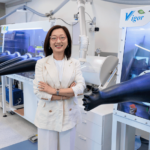
To create a carbon-free future, cars, buses, and even airplanes need batteries that can charge quickly, power heavier loads, and travel longer distances on a single charge. Emily Doyle, a graduate student at the University of Chicago Pritzker School of Molecular Engineering (UChicago PME), is working on the underlying chemistry that will lead to a new, more powerful class of lithium metal batteries.Yet, potency is just one part of a complex challenge, Doyle said.
“Engineering high-energy-density batteries is the biggest goal, but we see there are safety challenges, too,” said Doyle, who adds that traditional lithium-ion batteries have liquid electrolytes that are also flammable. Although uncommon, electric cars and buses have caught fire. “By eliminating the liquid electrolyte and replacing it with a solid, you heavily mitigate the risk of fire.”
The fourth-year graduate student is investigating the use of polymer electrolytes, which are less flammable than liquid electrolytes and more mechanically robust than other types of solid electrolytes. To further understand their potential, Doyle works side-by-side with computational researchers and fellow experimentalists in the lab of Chibueze Amanchukwu, the Neubauer Family Assistant Professor in Molecular Engineering. Amanchukwu also holds a joint appointment with Argonne National Laboratory, which UChicago manages for the U.S. Department of Energy.

Computationalists’ knowledge of artificial intelligence (AI), machine learning, and molecular dynamics means that Doyle can more efficiently study how various polymer electrolytes behave and how to improve their ionic conductivity, an essential component to designing effective and high-energy batteries.
“Having computationalists in the group means they are already invested in battery engineering,” Doyle said. “I don’t have to explain or prove to an AI specialist that my research is worth studying because our computationalists already know. It lowers the barrier to entry in doing AI-enabled research, which is nice.”
The interdisciplinary focus of UChicago PME, both in the Amanchukwu Lab and in the materials for sustainability theme, is why Doyle decided to study at PME. Now, nearing the end of her education, she also appreciates how PME faculty balance innovative research with practical application.
“I feel like everyone at UChicago PME is mission-focused on impact,” Doyle said. “That is really important to me. I want to see the work I’m doing go into effect one day and help change people’s lives.”
“I want to see the work I’m doing go into effect one day and help change people’s lives.”
PhD student Emily Doyle
From a young age, Doyle knew that impact and sustainability science would somehow shape her future. She spent part of her childhood in New Orleans, a city vulnerable to rising sea levels and more extreme climate events. Watching her family deal with their basement flooding time and time again while oil rigs continued to dot the Gulf Coast made her uneasy. She had initially planned to focus on wind, solar, or hydropower until she learned about the challenges and opportunities with next-generation battery design at the University of Notre Dame.
“Working on climate change was always top of mind for me and battery engineering was a natural jumping off point,” Doyle said. “There are so many aspects of a battery design that you have to fine-tune to perfection for it to work. For me, that it is a really cool—and important —challenge.”



